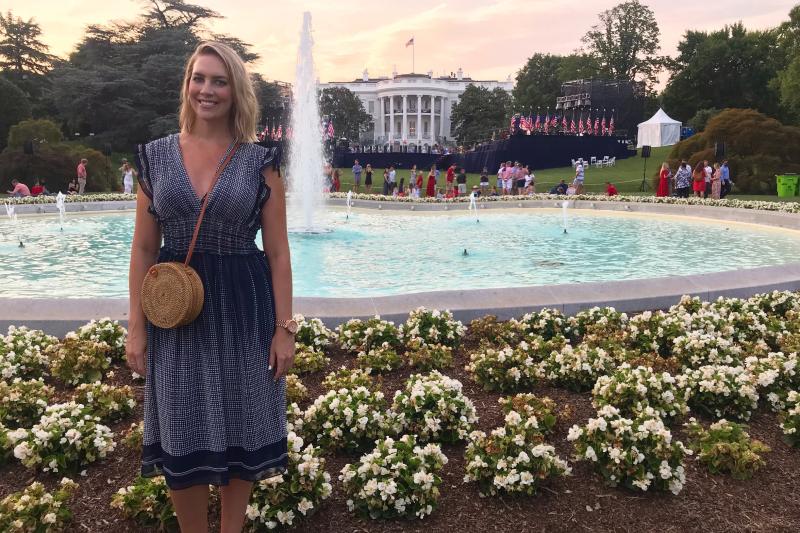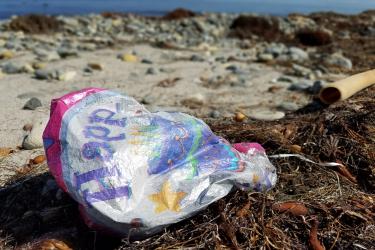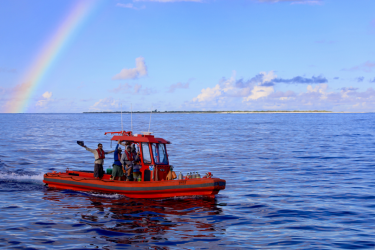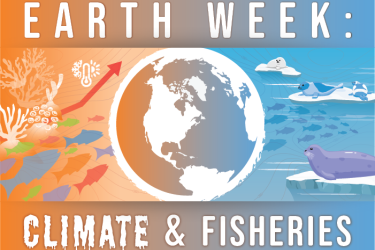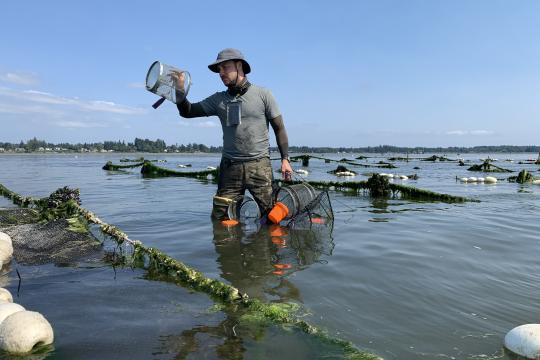What is your key responsibility?
My key responsibility is to advise the Deputy Assistant Administrator for Regulatory Programs on all issues in his portfolio. I actively engage across NOAA, and the Department of Commerce on regulatory program activities. These include supporting the conservation and recovery of marine mammals and endangered species; ensuring economically and biologically sustainable fisheries; and promoting habitat stewardship through restoration and conservation.
Where did you grow up?
I am from Arlington Heights, a northwest suburb of Chicago. My love of the ocean started even before my love of science. My mom likes to tell me that I started giving her gray hair when I was 2 years old. We were on a family trip to the Jersey shore, and she turned around and there I was—standing in the ocean, before I even knew how to swim. She ran over and scooped me up. The minute she put me back down, off I went, walking back towards the ocean. I was always fascinated with the ocean. It piqued my curiosity and I wanted to know about all the mysterious creatures that lived there.
Growing up in Illinois provided a challenge for me being interested in marine science. There was no ocean in sight, so I had to find a way to create opportunities for myself. In Chicago, our main source of anything ocean-related is the Shedd Aquarium. I started volunteering there over the summers in high school and I began to teach myself about marine species, ecosystems, and conservation. I talked to everyone that worked there and would ask them what they went to school for and what experience they had. I would soak up any information I could gather. During my time there, I was lucky enough to be able to go on a research expedition to the Bahamas, and I was hooked.
Is there anything about your childhood or where you grew up that influenced your career path?
When I was in seventh grade, I met the man who changed my life. His name is John Figlewicz, and he was my seventh grade science teacher. Mr. Fig, as we called him, was one of the best teachers I have ever had. His passion and enthusiasm for science was contagious.
He taught me the scientific method and helped me to complete my first full-scale research project, which took me to the Illinois state science fair for 2 years. Being able to complete a scientific research project was thrilling, and it felt like a major accomplishment. It is really quite amazing how such a small moment in your life can set you on a lifelong path; this was definitely the case for me. My doctoral dissertation is dedicated to Mr. Fig.
What is your educational background?
For undergraduate, I attended the University of Chicago for 2 years, and DePaul University for 2 years to receive a Bachelor of Science degree in biology. Following that, I moved to Fort Lauderdale to attend Nova Southeastern University for a master’s degree in marine biology. My thesis evaluated the spatial distribution of the cyanobacteria Lyngbya spp. on the coral reefs of Broward County, Florida. My doctoral degree is from Texas A&M University-Corpus Christi in Coastal and Marine System Science. My dissertation was a remote-sensing project that looked at the associations between chlorophyll and wind forcing over the entire Gulf of Mexico, derived from satellite observations.
What does Women's History Month mean to you?
During my doctoral defense at Texas A&M-Corpus Christi, one of my committee members asked me a question that caught me off guard. He said, “Tell me your top five female scientists of all time.” I sat there in stunned silence for what felt like an eternity. No one had even asked me that before—and additionally, why had I never thought about that until now? After letting the question sink in, I answered with a list of those women in science that have been pioneers in their fields and who have inspired me throughout my life. But, upon further reflection, I came to realize that question caught me off guard because science has historically been a male-dominated discipline.
Women’s History Month to me is a chance to shine a light on women and all of our amazing accomplishments. When the young women scientists of the future are asked who their top five female scientists are, my hope is that they don’t need to think or hesitate, because there will be such an overwhelming number of us to choose from.
What advice would you have for someone interested in a career at NOAA Fisheries?
My advice to someone who would like a career at NOAA Fisheries is to be persistent and to not give up. When pursuing a goal, sometimes you can’t see the light at the end of the tunnel. Stay positive and be confident in the direction you’re headed. If you visualize a positive outcome, it will happen. You have to learn and grow from disappointments and failures. Use those as motivation to keep moving forward.
